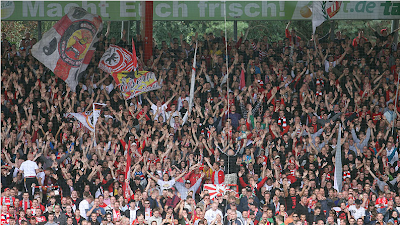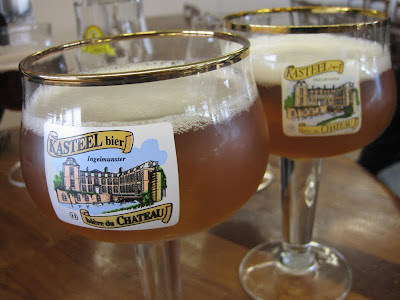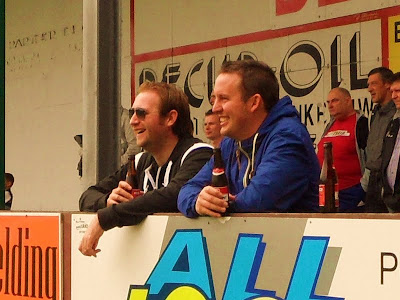Chelsea 3-1 Norwich City (27:08:11)
August 1992. Aged ten, there were many things I didn’t understand about football, having been converted to it, like so many others, by England’s run to the World Cup semi-final in Italy 1990, writes Juliet Jacques. Inexplicably, being from Surrey, I’d opted to support Norwich City, rather than our nearest top flight clubs, Crystal Palace and Wimbledon, or my mother’s team, Chelsea.
Looking back, the historical window where a child could consider Norwich one of England’s leading clubs was very small. As I learned from 90 Minutes and When Saturday Comes, it was supposed to close that summer, after star striker Robert Fleck joined Chelsea for £2.1m, becoming their record signing. Having narrowly escaped the previous season, Norwich were favourites for relegation, despite two FA Cup semi-finals and two top-five finishes in the last five years.
Norwich’s strategy of selling their stars and replacing them with top flight reserves, experienced free transfers and lower league players continued to work better than expected, and they finished third in the new Premier League in 1993. City’s campaign included two wins over Chelsea, the first at Carrow Road against a side that featured Andy Townsend (sold by Norwich to Chelsea in July 1990 for £1.2m), the likes of Vinnie Jones, Mick Harford and Joe Allon, and ex-trainees Eddie Newton, Damian Matthew and Graham Stuart. The second win, at Stamford Bridge, became infamous for the two Dave Beasant blunders that handed Norwich a 3-2 victory, and ended his Chelsea career.
Soon, though, I saw how money, and the concerns of a club’s owner, could rapidly change a seemingly tightly run club’s fortunes. Norwich chairman Robert Chase’s refusal to release funds led to manager Mike Walker decamping to Everton, before several players were sold, including astute young centre-forward Chris Sutton, who became England’s first £5m player. Norwich were relegated in 1995 but recruited talented Wycombe manager Martin O’Neill. O’Neill quit after receiving little of the £5m promised for transfers, spending virtually nothing besides £650,000 to rescue Fleck from his disastrous spell at Chelsea, where he scored just four goals in 48 Premier League games.
Fleck and Norwich’s attempts to recapture former glories remaining unfruitful long after furious fan protests forced Chase to resign, whilst Chelsea went from strength to strength. As Fleck left, Ruud Gullit arrived, followed by international stars such as Italy’s Roberto di Matteo, Gianluca Vialli and Gianfranco Zola, French World Cup winners Marcel Desailly, and Frank Lebœuf (and later captain Didier Deschamps) and many others who gradually moved Chelsea beyond the likes of Harford, Jones and Allon, Newton, Matthew and Stuart. With a mixture of continental flair and British grit, and home-grown talent such as Graeme Le Saux and Michael Duberry, this hugely enjoyable Chelsea team won the club’s second FA Cup in 1997 and then their second European Cup Winners’ Cup the next season, before another Cup triumph in 2000.
Built during the power struggle between owner Ken Bates and vice-chairman Matthew Harding, before Harding’s death in a helicopter crash, this team was very different to the one my mother used to watch with my grandfather in the early Seventies. When Bates sold the club, which he said was almost bankrupt, to Russian billionaire Roman Abramovich for £140m in summer 2003, Chelsea entered a new stage in their history, which felt both like a continuation of their late Nineties successes and a step beyond it. Italian coach Claudio Ranieri lasted just one season before José Mourinho replaced him, spending exorbitant sums on Didier Drogba and others, grotesquely distorting the transfer market and breaking Arsenal and Manchester United’s recent dominance of English football.
Even before Abramovich changed the game, Norwich were out of contention for major honours, perhaps for ever. As Mourinho arrived in the Premiership, City returned, going through five managers before settling on Nigel Worthington, who found the right blend to get them back into the top flight but not to keep them there. In December 2004, Norwich lost 4-0 at Chelsea, partly due to an error from Denmark full-back Thomas Helveg – their only player who, at his peak, might have got near Mourinho’s ruthlessly efficient outfit.
Neither Worthington nor Norwich’s board ever seemed comfortable with the foreign influences on the Premier League. Adrift in the relegation zone and reluctant to play Helveg, Morocco midfielder Youssef Safri or Sweden winger Mattias Jonson, Worthington inexplicably signed 34-year-old Graham Stuart to add experience to his squad, but Stuart and new record signing Dean Ashton could not save Norwich. As Chelsea won their first title since 1954-1955 – the season in which my mother was born – Norwich were relegated, losing 6-0 at Chelsea’s local rivals Fulham in a must-win final game.
Mourinho’s Chelsea powered their way to a dispiritingly easy second title, whilst Nigel Worthington’s decision to fill his team with (mostly) British players who’d “understand” the second tier started a process of decline that led to his sacking and three more managers (Peter Grant, Glenn Roeder and Bryan Gunn) coming and going as Norwich fell into League One in 2009. During this time, Abramovich fired Mourinho and then hired Avram Grant, Guus Hiddink and Luiz Félipe Scolari in an attempt to wrestle the Premiership title back from resurgent Manchester United, who had themselves opened up to foreign investment in their successful effort to break Chelsea’s stranglehold.
2009-2010 was a remarkable success for both clubs: new coach Carlo Ancelotti led Chelsea to a Premier League and FA Cup double, during which they played a brand of attacking football rarely seen since Ranieri’s management, becoming the first team to score more than one hundred top flight goals since 1963. Meanwhile, Norwich won the League One title at a canter under Paul Lambert, and – miraculously – were immediately promoted again, with the trip to Stamford Bridge coming as their third game back in the Premier League.
Having endured defeats at Colchester United, Leyton Orient, Crystal Palace and others during City’s long exile, I felt I deserved the chance to watch my club test themselves against some of the most successful players of this generation. Despite being appalled by the expense and expecting nothing but a miserable thrashing, and, when I consider it rationally, hating everything about the Premier League, I spent £47.50 on a ticket for the lower tier of the Shed end. Truly, I am addicted, and thus easily exploited – and besides, I might just be there when Norwich win at Chelsea, and as a fan, you can’t put a price on that. (Of course, you can, and Chelsea have …)
When Abramovich’s Chelsea won their first title, my friend Joe Stretch was one of many to lament its manner, telling me that the club had no soul and no history. I felt he was being unfair: the 1955 champions led by Roy Bentley and (particularly) the stylish FA Cup winners of 1970 are fondly remembered, with Ron Harris, Peter Osgood, Alan Hudson and Peter Bonetti well recalled by football fans. There was much violence at Stamford Bridge during the Eighties as Chelsea declined; later, the Headhunters firm, formed in the Sixties and still around today, featured prominently in The Football Factory – one of several books and films to examine (if not romanticise) hooliganism after the fighting, crumbling terraces and fences gave way to the new football culture of which I formed a part.
I take my seat just behind the goal a few minutes before kick-off – I’ve missed Norwich’s line-up, but Chelsea’s includes the long-standing English heart of their side, John Terry and Frank Lampard, as well as Drogba and his £50m partner Fernando Torres. Once the teams are announced, the PA plays Blue Day, written by Suggs and performed with members of Chelsea’s squad before the 1997 FA Cup final victory (which seems a more likely choice than Norman Long’s sarcastic 1933 music hall number about the hypothetical ‘Day That Chelsea Went and Won the Cup’).
There are not as many conscious attempts to emphasise the club’s history as at Arsenal’s new Emirates Stadium (with its murals of famous players outside and dates of trophies on its stands), a banner saying ‘Bentley Boys’ and another commemorating Matthew Harding being the main reminders of Chelsea’s past. The other banners seem more concerned with providing legitimacy to a contemporary set-up that few neutrals seem prepared to accept, although I feel that this team has acquired a level of cultural weight through its longevity and relative success – plenty of other teams have tried to buy trophies and failed, of course.
There are tributes to ‘JT’ and ‘Super Frankie Lampard’ – the two Londoners who bridged the Bates and Abramovich eras and have been central to their three recent title wins. Both are booed by Norwich’s fans throughout, along with Drogba and the objectionable Ashley Cole, but it’s not hard to understand why the Chelsea crowd worship them – their enthusiastic, emblematic contribution to the 2005 championship was particularly memorable.
Otherwise, two things seem to epitomise the sanitised, commercialised 21st century football that, for some, Chelsea and the imposingly redeveloped Stamford Bridge represent – firstly, banners celebrating supporters’ clubs in Dundalk, Cyprus, Hungary and Bermuda, and secondly a sign next to the goal, like those in office receptions on rainy mornings, saying ‘Beware Flying Footballs: Players Practising’ as if anyone who’d followed Norwich over the years would not recognise strikers hammering shots into the stands to be an occupational hazard. It’s removed before kick-off, but every time the ageing and ponderous Lampard rifles a free-kick over the bar, I think of it and smirk.
Norwich’s side contains little Premier League experience and when the entire defence backs away from full-back José Bosingwa, allowing him to fire Chelsea into a seventh-minute lead, I fear the anticipated hammering. However, Norwich work hard to stay in the game, and are helped by the utter ineptitude of Torres, who looks just as out of place as Fleck or Sutton – the latter brought to Chelsea for £10m in 1999 – did during their spells in West London.
One of the world’s greatest strikers until some point before the 2010 World Cup, which he won despite his own minimal contribution, Torres now looks like someone who does not like or even really understand football, being forced to play against his will. One moment sums up his decline in form and confidence: Malouda plays in a cross from the left, which the Torres of 2009 would have brought down before turning and smashing his team into a two-goal lead. Instead, he limply chests the ball back to Drogba who is forced wide by City’s rapidly improving defence, and besides a kick at Leon Barnett, his threat is negligible throughout.
Just as Torres resembles Fleck at Chelsea, so Grant Holt recalls Fleck’s glorious first spell with Norwich. Amazingly, the ‘Holy Trinity’ of forwards that fired Norwich out of League One in 2009-2010 all start at Stamford Bridge, with delicate playmaker Wes Hoolahan and industrious youth team graduate Chris Martin combining as well with Holt against Chelsea as they did against Bristol Rovers, Yeovil Town et al two years earlier. Like ‘Flecky’, Holt is burly, combative and deceptively skilful, loved by Norwich supporters as much for his ability to irritate opposing players and fans as for his prolific scoring and smart hold-up play. During the second half, City have Chelsea rattled, substitutes Anthony Pilkington and Steve Morison threatening, if not penetrating, before Hilário and Branislav Ivanović fail to decide who should meet a long, hopeful cross. They collide and Holt instinctively volleys home. Holt has progressed the bottom division of the English League to the top in consecutive seasons (having previously played non-league football) and has now scored in all four: he and his team-mates race to the predictably rapturous away fans.
For all the disparity – Chelsea paid 125 times as much for Torres as Norwich did for Holt – it seems, fleetingly, that the visitors mightbe able to snatch a point, or even more. There’s a long delay after Drogba clashes with Norwich goalkeeper John Ruddy and is eventually stretchered off, but the game turns when Chelsea’s Brazilian international midfielder, Ramires, who has looked as leaden as Lampard so far, races onto a perfectly-pitched through ball. Ruddy rushes out to meet him, forcing him wide – and then brings him down. The referee rightly gives a penalty, but sends off Ruddy as well, despite Norwich defenders covering the goal. Teenager Declan Rudd makes his Premier League debut, his first action being to retrieve the ball after Lampard’s fierce, well-judged shot.
Having barely emitted a sound when Chelsea first took the lead, Stamford Bridge finally comes alive. A small group of home fans in the upper tier of the Shed end, who seem slightly out of place in a ground that perhaps belongs to them more than anyone else, scream at the Norwich crowd, as if to put us in our place. The man behind me, who has been particularly resentful in his abuse of Terry and Lampard, has had enough: “Fucking biased refs! Fucking media bigging this shit up! Fucking Chelsea and their fucking Russian owner! They’ve got no fucking soul! They used to but they fucking don’t now!” Nobody in the away end argues with him, however they feel about the underlying xenophobia, and less and less of the Chelsea fans I know would entirely disagree either.
A minute later, new Chelsea manager André Villas-Boas finally cuts his losses on Torres, replacing him with 18-year-old, £18m Belgium forward Romelu Lukaku – the second of Chelsea’s new signings to come off the bench, after fellow Spanish World Cup winner Juan Mata has also made his debut. Mata scores a well-taken goal in the eleventh minute of injury time, but Norwich have lost by then anyway.
As Blue is the Colour, by the Chelsea squad ahead of the 1972 League Cup final (which they lost), echoes around the Bridge, we leave our seats strangely pleased, satisfied that our collection of loanees and signings from Shrewsbury Town, Colchester United, Brighton & Hove Albion and elsewhere have essentially been beaten only by a late penalty and a harsh red card. We talk about how we’d written this game off as soon as the season started, coming partly out of habit, and partly because we’d grown up thinking that there was always – always – chance that smaller sides could upset the odds, and though it can still happen, it seems to happen far less now than in the early Nineties.
As we recall Fleck and Mike Walker, I remember that the present situation owes much to the horror of Eighties football culture, particularly the Hillsborough disaster. Norwich played in the other FA Cup semi-final that day, and my older friends who were at Villa Park say that the fenced terraces and poor crowd-handling could easily have caused a similar tragedy, and I realise that my nostalgia is for a world that I never experienced, and can never really know.
Like this? Juliet has also written on the French clásico between Marseille and PSG for EFW.
Juliet Jacques is the author of Orwell Prize longlisted Guardian blog Transgender Journey. She also covers European literature, experimental film, art, music & (usually French) football on her BLOG.
You can follow both Juliet and European Football Weekends on Twitter







































